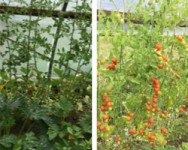Event Details
Date
July 12, 2017
Time
5:00 PM - 7:00 PM
Location
Slack Hollow Farm
177 Gilchrist Rd
Argyle, NY 12809
Cost
$15.00 /individual
$25.00 for two or more people from the same farm
Host
NOFA-NY
585-271-1979
NOFA-NY On Farm Field Days
High Tunnel Tomatoes - Early and Mid-Season Management for Optimal Health and Productivity
July 12, 2017
Long-term organic high tunnel soil health and fertility management is challenging. This field day will discuss best management practices for growing tomatoes in a high tunnel, especially early and peak season management practices. Seth Jacobs of Slack Hollow Farm will share his experiences with tomatoes and how he successfully manages a high tunnel from a long term perspective. NOFA-NY and Cornell Cooperative Extension will discuss what they are learning through the New York Farm Viability Institute funded initiative, "Best Management Practices for Long Term Profitable High Tunnel Soil Fertility and Health."
Additionally, there will be other summer high tunnel crop options including cucumbers and basil. An update on leek moth in allium crops will be presented plus a discussion of downy mildew in basil. Attendees will see a demonstration of an in-row flame weeder.
This event is produced by NOFA-NY with support from the New York Farm Viability Institute.
This is one of the 2017 On-Farm Field Days hosted by NOFA-NY. Pre-registration is strongly encouraged for all field days, if you will be paying with a credit card. If paying with cash or check, you will register on-site. There is no need to pre-register online if paying with cash or check, just show up!
Enter your information to see details on each Field Day, and register for those you are interested in! All costs will be $15/individual, $25 for two or more people from same farm, unless otherwise noted. Light refreshments will be provided.



































